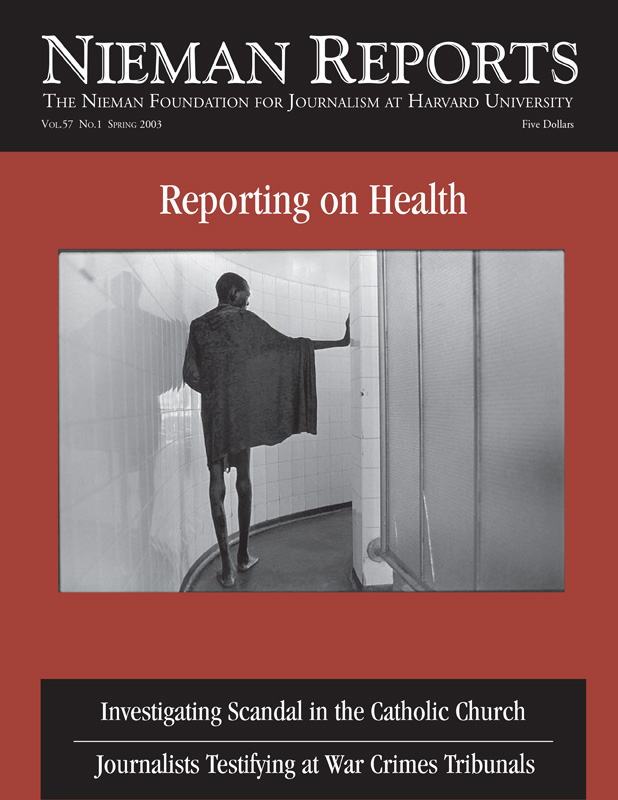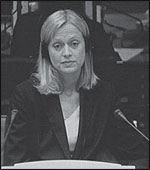Last year I was approached by a member of one of the 34 news organizations that were campaigning against the ability of the war crimes tribunal to compel journalists to testify at The Hague tribunal. I was asked to sign the petition supporting the refusal by veteran Washington Post reporter Jonathan Randal to appear in court. “We will understand if you can’t sign it as someone now working for the United Nations,” the friend told me.
I did not sign the petition. And I made my decision not because of my recent association with the United Nations (as a spokesman for the Office on Drugs and Crime in Vienna, a position that has nothing to do with this debate), but because of my conflicted feelings about the issue.
As a longtime journalist, I understand the concerns of news organizations—maintaining professional impartiality, avoiding increased risks to journalists in future conflicts if they are perceived as potential witnesses in prosecution of war crimes, and protecting sources’ and reporters’ access to war zones. But as someone who practiced journalism under fire—running a daily from the atomic-bomb shelter at the frontline of the besieged Bosnian capital of Sarajevo—I have a great admiration for colleagues who decided to testify in order to help bring to justice those responsible for genocide.
Acting on the Facts
I agree with the court’s decision not to compel journalists to testify unless the information they have is essential to the trial or it cannot be obtained in any other way. I also strongly support those who went to The Hague as witnesses for the prosecution, and I have reasons—both personal and professional—for feeling the way I do.
There are some things in this world that a person simply can’t be neutral about. Genocide is certainly one of them. In the Freedom Forum’s Media Studies Journal (Fall 1995), I published an article, “Neutrality vs. Objectivity,” in which I set forth my views. I used the war in Bosnia and reporting on genocide to argue that journalists can be perfectly objective without necessarily being neutral.
The reporting of some brave individuals in American and British media such as Roy Gutman (then with Newsday), John Burns (The New York Times), Peter Jennings (ABC documentaries), Christiane Amanpour (CNN), David Rhode (then The Christian Science Monitor), Ed Vulliamy and Maggie O’Kane (The Guardian), to mention just those few, provide examples of this combination of objective fact-gathering used to tell stories that made a positive difference. Their reporting was based on facts, yet the stories they told were instrumental in moving governments into action in the face of genocidal atrocities in the last decade of the “never again” century.
RELATED ARTICLES
“Consequences Occur When Reporters Testify”
– Roy GutmanGutman and Vulliamy, with their firsthand reports about the existence of concentration camps in Bosnia, helped to save thousands of lives. Once their stories and pictures of starving inmates reached the public, the Red Cross entered those areas, put together lists of camps and prisoners, and brought an end to torture and execution. Gutman and Vulliamy emerged from their professional experiences with different feelings about journalists serving as witnesses in the court. While Gutman believes reporters do their part by exposing atrocities to the public, Vulliamy argues that it is an extension of journalists’ mission to help bring to justice those responsible for genocide.
The search for “neutrality at any cost”—to the point of looking for balance in reporting on war where there is no balance on the ground—distorts reality. A case in point was the massacre in Srebrenica. In July 1995, Serbian forces under command of general Ratko Mladic took over that supposedly “safe zone,” and in a matter of days killed almost the entire male population of the town, some 8,000 people.
Some television networks—practicing that art of perfect neutrality, which has value in debates in civil societies but not in the case of massive slaughter of innocent civilians—brought to their studios a “representative of the other side,” a young lady speaking for those responsible for the slaughter. She shrugged off the story of the massacre with a favorite line of ultranationalist propaganda, “This is only the [Bosnian] Muslim government trying to blame Serbs, nothing else.” It is in situations such as this one that neutrality works against objectivity.
Memory and the Power of Testimony
On a personal level, I can’t think about the question of journalists testifying about war crimes without thinking about our two slain colleagues, Kjasif Smajlovic and Daniel Pearl. Kjasif was a small-town (Zvornik) correspondent for my paper—the Sarajevo daily, Oslobodjenje. He was the first of 51 journalists killed in three-and-a-half years of war in Bosnia. He died because his town was on the Bosnian bank of the Drina River. This river separated Serbia from Bosnia, and his was the first town to be “ethnically cleansed” to connect Serbia proper with the Serbinhabited territories in Croatia as part of the grand plan of creating “Greater Serbia.”
Kjasif knew he faced a death threat: Serbian artillery was pounding his town in order to discourage any defense. This brave man put his family on one of the trucks full of refuges escaping the imminent fall of Zvornik while he continued to report. In his last call to our regional office, announcing his daily work plan, he said, “If I manage, I will report on the attack on Zvornik, and then you won’t hear from me again.” He did not manage. Serbian paramilitary fighters found him in his correspondent’s office behind his old-fashioned typewriter, writing his last report. They tortured and killed him. He was buried in a mass grave along with about 100 of his fellow citizens, marked only by a number tied to his toe. Daniel Pearl’s death is a more recent and wellknown story of The Wall Street Journal reporter brutally murdered by Islamic militants in Pakistan.
Neither of these reporters are here to participate in debates about journalists as potential witnesses to the war crimes. And dozens of other journalists were killed in the Bosnian war long before the International Criminal Tribunal for the Former Yugoslavia was even created. “Press” signs, visibly displayed on their cars, served as one of the favorite targets for Serb snipers. My colleagues at Oslobodjenje in Sarajevo risked their lives daily to keep their newspaper alive, but I always felt we only shared the terror of our city. We risked no more than Sarajevo’s children, some 1,800 of whom were killed by snipers and artillery surrounding the city.
After living in a besieged European capital, terrorized for three-and-a-half years and deprived of the most basic human needs—no running water or heating in windowless apartments with subfreezing temperatures, no electricity nor food—I feel strongly that bringing those most responsible to justice is a much needed symbolic first step towards reconciliation among the innocent on all sides.
I have a special respect for Serbian journalists who recently went to The Hague to testify against the man accused of presiding over a “joint criminal enterprise,” long-time Serbian strongman Slobodan Milosevic. Dejan Anastasijevic, who reports for Belgrade’s Vreme, was one of those brave men who were not afraid to give televised testimony about war crimes about which they had reported. He wrote about his experience for Time, a magazine to which he also contributes reporting. “It may have been the most important thing I will ever do,” Anastasijevic wrote. “After my testimony was over I felt as if a great burden had been lifted. For me, the Balkan wars were finally over. Now I could go home.”
Kemal Kurspahic, a 1995 Nieman Fellow, is a former editor in chief of the Sarajevo daily Oslobodjenje, 1988-94. For keeping his paper alive during the siege of Sarajevo, he was named the 1993 International Editor of the Year (World Press Review-New York) and a World Press Freedom Hero (IPI–Vienna). He has published two books in the United States, “As Long As Sarajevo Exists” (Pamphleteers Press, 1997), and “Prime Time Crime: Balkan Media in War and Peace” (United States Institute of Peace Press, 2003).



